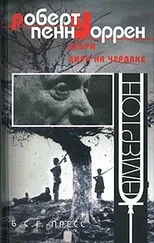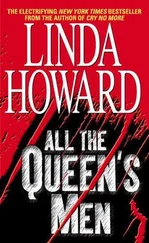Роберт Уоррен - All the king's men
Здесь есть возможность читать онлайн «Роберт Уоррен - All the king's men» весь текст электронной книги совершенно бесплатно (целиком полную версию без сокращений). В некоторых случаях можно слушать аудио, скачать через торрент в формате fb2 и присутствует краткое содержание. Жанр: Современная проза, на английском языке. Описание произведения, (предисловие) а так же отзывы посетителей доступны на портале библиотеки ЛибКат.
- Название:All the king's men
- Автор:
- Жанр:
- Год:неизвестен
- ISBN:нет данных
- Рейтинг книги:4 / 5. Голосов: 1
-
Избранное:Добавить в избранное
- Отзывы:
-
Ваша оценка:
- 80
- 1
- 2
- 3
- 4
- 5
All the king's men: краткое содержание, описание и аннотация
Предлагаем к чтению аннотацию, описание, краткое содержание или предисловие (зависит от того, что написал сам автор книги «All the king's men»). Если вы не нашли необходимую информацию о книге — напишите в комментариях, мы постараемся отыскать её.
All the king's men — читать онлайн бесплатно полную книгу (весь текст) целиком
Ниже представлен текст книги, разбитый по страницам. Система сохранения места последней прочитанной страницы, позволяет с удобством читать онлайн бесплатно книгу «All the king's men», без необходимости каждый раз заново искать на чём Вы остановились. Поставьте закладку, и сможете в любой момент перейти на страницу, на которой закончили чтение.
Интервал:
Закладка:
Then the Boss asked, softer still, almost whispering, "Did you know that, Doc?"
Adam wet his lips and said, "There is one question I should like to ask you. It is this. If, as you say, there is only the bad to start with, and the good must be made from the bad, then how do you ever know what the good is? How do you ever recognize the good? Assuming you have made it from the bad. Answer me that."
"Easy, Doc, easy," the Boss said.
"Well, answer it."
"You just make it up as you go along."
"Make up what?"
"The good," the Boss said, "What the hell else are we talking about. Good with a capital G."
"So you make it up as you go along?" Adam repeated gently.
"What the hell else you think folks been doing for a million years, Doc? When your great-great-grandpappy climbed down out of the tree, he didn't have any more notion of good or bad, or right and wrong, than the hoot owl that stayed up in the tree. Well, he climbed down and he began to make Good as he went along. He made up what he needed to do business, Doc. And what he made up and got everybody to mirate on as good and right was always just a couple of jumps behind what he needed to do business on. That's why thing change, Doc. Because what folks claim is right is always just a couple of jumps short of what they need to do business. Now an individual, one fellow, he will stop doing business because he's got a notion of what is right, and he is a hero. But folks in general, which is society, Doc, is never going to stop doing business. Society is just going to cook up a new notion of what is right. Society is sure not ever going to commit suicide. At least, not that way and of a purpose. And that is a fact. Now ain't it?"
"Is it?" Adam said.
"You're damned right it is, Doc. And right is a lid you put on something and some of the things under the lid look just like some of the things not under the lid, and there never was any notion of what was right if you put it down on folks in general that a lot of them didn't start squalling because they just couldn't do any human business under that kind of right. Hell, look at when folks couldn't get a divorce. Look at all the good women got beat and the good men got nagged and couldn't do any human damned thing about it. Then, all of a sudden, a divorce got to be right. What next, you don't know. Nor me. But I do know this." He stopped, leaned forward again, the elbows again cocked out.
"What?" Adam demanded.
"This. I'm not denying there's got to be a notion of right to get business done, but by God, any particular notion at any particular time will sooner or later get to be just like a stopper put tight in a bottle of water and thrown in a hot stove the way we kids used to do at school to hear the bang. The steam that blows the bottle and scares the teacher to wet her drawers is just the human business that is going to get done, and it will blow anything you put it in if you seal it tight, but you put it in the right place and let it get out in a certain way and it will run a freight engine." he sank back again into the chair, his eyelids sagging now, but the eyes watchful, and the hair down over his forehead like an ambush.
Adam got up suddenly, and walked across the room. He stopped in front of the dead fireplace, with old ashes still in it, and some half-burned paper, though spring was on us, and there hadn't been any fire for a time. The window was up, and the night air came into the room, with a smell different from the diaper-and-cabbage smell, a smell of damp grass and the leaves hanging down from the arched trees in the dark, a smell that definitely did not belong there in that room. And all of a sudden I remembered once how into a room where I was sitting one night, a big pale apple-green moth, big as a bullbat and soft and silent as a dream–a Luna moth, the name is mine, and it is a wonderful name–came flying in. Somebody had left the screen door open, and the moth drifted in over the tables and chairs like a big pale-green, silky, live leaf, drifting and dancing along without any wind under the electric light where a Luna moth certainly did not belong. The night air coming into the room now was like that.
Adam leaned an elbow on the wooden mantelpiece where you could write your name in the dust and the books were stacked and the old, dregs-crusted coffee sat. He stood there as though he were all by himself.
The Boss was watching him.
"Yeah," the Boss said, watchful, "it will run a freight engine and–"
But Adam broke in, "What are you trying to convince me of? You don't have to convince me of anything. I've told you I'd take the job. That's all!" He glare at the bulky man in the big chair, and said, "That's all! And my reasons are my own."
The Boss gave a slow smile, shifted his weight in the chair, and said, "Yeah, your reasons are your own, Doc. But I just thought you might want to know something about mine. Since we're going to do business together."
"I am going to run the hospital," Adam said, and added with curling lips, "If you call that doing business together."
The Boss laughed out loud. Then got up from the chair. "Doc," he said, "just don't you worry. I'll keep your little mitts clean. I'll keep you clean over, Doc. I'll put you in that beautiful, antiseptic, sterile, six-million-dollar hospital, and wrap you in cellophane, untouched by human hands." He stepped to Adam and slapped him on the shoulder. "Don't you worry, Doc." he said.
"I can take care of myself," Adam affirmed, and looked down at the hand on his shoulder.
"Sure you can, Doc," the Boss said. He removed his hand from the shoulder. Then his tone changed, suddenly businesslike and calm. "You will no doubt want to see all the plans which have been drawn up. They are subject to your revision after you consult with the architects. Mr. Todd, of Todd and Waters, will come to see you about it. And you can start picking your staff. It is all your baby."
He turned away and picked up his hat from the piano top. He swung back toward Adam and gave him a summarizing look, from top to toe and back. "You're a great boy, Doc," he said, "and don't let 'em tell you different."
Then he wheeled to the door, and went out before Adam could say a word. If there was any word to say.
Sugar-Boy and I followed. We didn't stop to say good night and thanks for the hospitality. That just didn't seem to be in the cards. At the door, however, I looked back and said, "So long, boy," but Adam didn't answer.
Down in the street, the Boss hesitated on the curb, beside the car. Then he said, "You all go on. I'm walking." He turned up the street, toward town, past the crummy apartment house and the little grocery and the boarding houses and the shotgun bungalows.
Just as I climbed in beside Sugar-Boy, in the place the Boss always took, I heard the burst of music from the apartment house. The window was open and the music was very loud. Adam was beating the hell out of that expensive piano, and filling the night air with racket like Niagara Falls.
We rolled down the street, and passed the Boss, who, walking along with his head down, didn't pay us any mind. We pulled on into one of the good streets with the trees arching overhead and the new leaves looking black against the sky, or pale, almost whitish, where the rays of a street lamp struck them. We were beyond the sound of Adam's music now.
I lay back and closed my eyes ant took the sway and dip of the car, which was soft and easy, and thought of the Boss and Adam Stanton facing each other across that room. I had never expected to see that. But it had happened.
I had found the truth, I had dug the truth up out of the ash pile, the garbage heap, the kitchen midden, the bone yard, and had sent that little piece of truth to Adam Stanton. I couldn't cut the truth to match his ideas. Well, he'd have to make his ideas match the truth. That is what all of us historical researchers believe. The truth shall make you free.
Читать дальшеИнтервал:
Закладка:
Похожие книги на «All the king's men»
Представляем Вашему вниманию похожие книги на «All the king's men» списком для выбора. Мы отобрали схожую по названию и смыслу литературу в надежде предоставить читателям больше вариантов отыскать новые, интересные, ещё непрочитанные произведения.
Обсуждение, отзывы о книге «All the king's men» и просто собственные мнения читателей. Оставьте ваши комментарии, напишите, что Вы думаете о произведении, его смысле или главных героях. Укажите что конкретно понравилось, а что нет, и почему Вы так считаете.





![Роберт Уоррен - Рассказы [Компиляция]](/books/419993/robert-uorren-rasskazy-kompilyaciya-thumb.webp)


